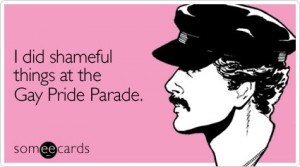Rebecca Kingston is Associate Professor of political science at the University of Toronto, and the editor of Bringing the Passions Back In: The Emotions in Political Philosophy (2008). She recently visited the Centre to give one of our lunch-time seminars, and spoke about her new book, Public Passion: Re-thinking the Grounds for Political Justice. This is our third post for #shameweek.
There is a clear ambiguity or disjuncture in how themes of shame circulate politically and culturally in liberal democracies. On the one hand, there is a theory and political dynamic that suggests that contemporary liberal democracy defines itself through the overcoming of shame in all quarters.
Many progressive political movements –civil rights, feminism, LBGT- have seen their task as not only one of assuring equal rights to their constituencies, but in overcoming long traditions of stigmatization and shaming that appeared to ground and justify the denial of equality. Along this line we can see many reasons to endorse Avishai Margalit’s resonating account of the ‘decent society’ as one that avoids the humiliation of any of its members. It is this sensitivity that fueled popular disgust of the treatment of the Abu Ghraib prisoners by American soldiers.
Yet, it would also appear that in the very process of defending and appealing to the central values of liberal democracy, there is an ongoing dynamic of shame and shaming that continue to occur. Stripping of knighthoods aside, recently done, it would appear, on the grounds of a lack of financial and administrative competency, parliamentary oppositions thrive on the attack that those in power threaten to undermine the very standards of decency in welfare terms or otherwise, on which the postwar settlement was based. The media also often succeeds on a logic of demonstrating the inability of those in positions of power and influence to live up to basic rules of ethics or competency.
It could be suggested that this second reliance on shame is central to the working and indeed the self-understanding of liberal democratic citizens and is indispensable to the enforcement of public and governmental responsibility. Shame with regard to practices of the past helps to fuel our broad sense of history and progress and relative confidence in liberal democratic society.
On a more popular level, the spiraling rounds of reality television revealing filthy households, and ill-behaved children among other vices, also appear to thrive on pointing the fingers at the deficiencies of others to make us smug while simultaneously and somewhat paradoxically gnawing at our insecurities and urging us on to manage our households, children, etc. better.
How does one come to terms with this apparent contradiction between experiences of shame that are clearly debilitating and those that seem to flourish in our era? It would seem ill-advised to advocate the banning of all invocations of shame in the public sphere, as suggested by Martha Nussbaum (who claims that all instances of shaming can be traced back to a primitive manifestation, thereby carrying the potential to be harnessed to very destructive ends), if only for the reason that they appear to be irrepressible and indeed part of the very complex emotional mix (or ‘public passion’) that constitutes us as liberal democratic citizens.
The mystery of shame in this context is how an emotion that would appear to challenge norms of equality at its very core, not only thrives, but circulates so as to sustain a regime defined by those same norms.



Pingback: Shameless | The History of Emotions Blog